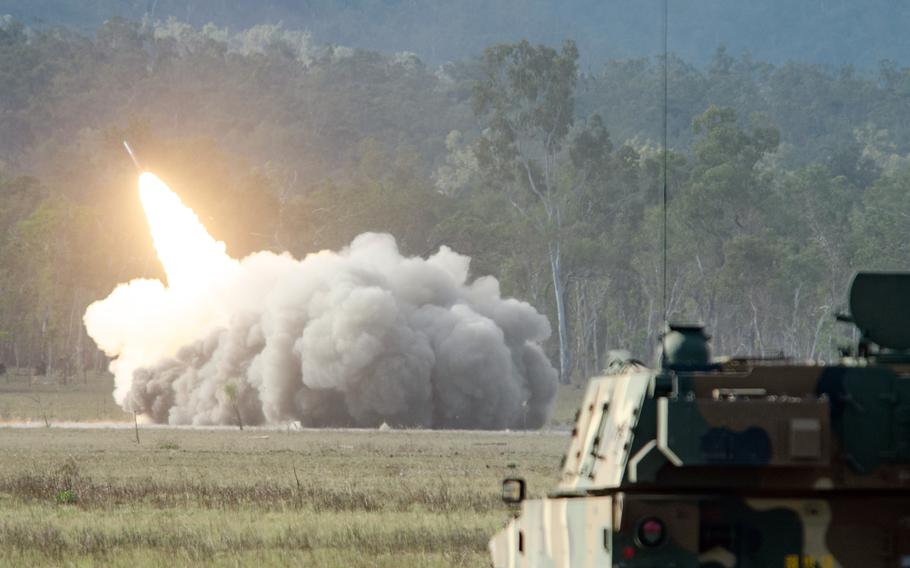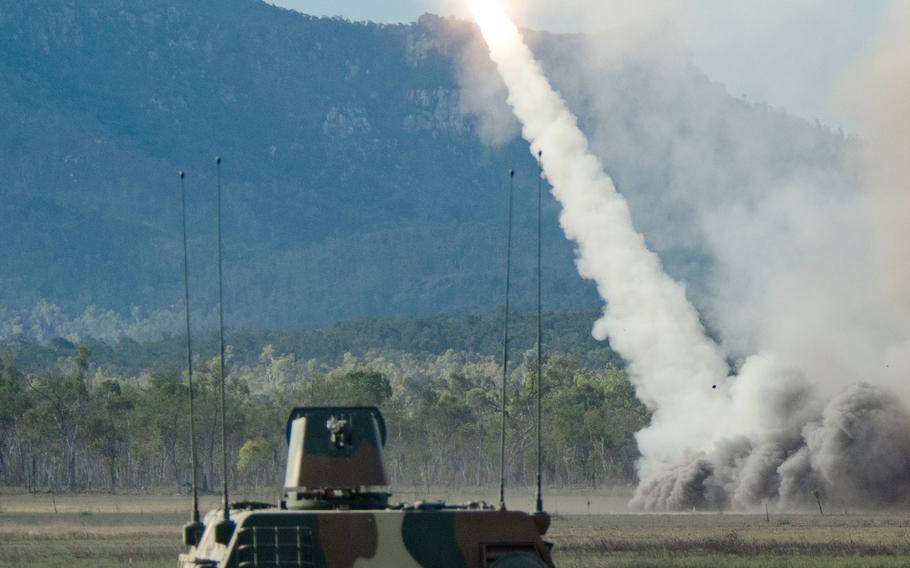SHOALWATER BAY TRAINING AREA, Australia — Dozens of mortar shells and rockets screamed across the Australian bush into a mountainside over the weekend, one of two live-fire demonstrations that kicked off the largest-ever Talisman Sabre exercise.
Troops from seven countries gathered at Shoalwater Bay Training Area — 442 miles north of Brisbane in eastern Australia — on Saturday to watch American, Australian, South Korean and Japanese crews fire artillery during a simulated attack. Behind the scenes, support personnel from France, Germany and New Zealand also participated.
“This event here is very, very important for us, because it’s not just the missiles shooting, it’s about us working with each other; being able to work with another military or another nation is about the human connectivity,” Brig. Gen. Nicholas Foxall, commander of the Australian army’s 1st Brigade, told reporters before the demonstration. “That is what this event is all about.”

U.S. soldiers fire an M142 High Mobility Artillery Rocket System, or HIMARS, during a Talisman Sabre drill at Shoalwater Bay Training Area in Queensland, Australia, Saturday, July 22, 2023. (Jennessa Davey/Stars and Stripes)
At Beecroft Weapons Range, 1,000 miles south of Shoalwater Bay near Jervis Bay on Australia’s eastern coast, the Japan Ground Self-Defense Force kicked off Talisman Sabre with its own live-fire demo. It launched a Type 12 surface-to-ship missile from Australian soil for the first time, the Australian Defence Force said in a Saturday news release.
Now in its 10th year, the biennial Talisman Sabre is expected bring more than 30,000 personnel, nearly double the number of troops deployed in 2021 during the COVID-19 pandemic, with additional participants from the United Kingdom, Canada, Indonesia, Fiji, Tonga and Papua New Guinea.
The exercise provides an opportunity for the individual nations to practice teamwork and communication in the event of “whatever crisis may exist in our region in the future,” Lt. Gen. Greg Bilton, the Australian Defence Force chief of joint operations, said Friday during the exercise’s opening ceremony in Garden Island, Australia.
That threat isn’t from any specific country, according to Talisman Sabre officials.

South Korean soldiers fire a self-propelled K9A1 Thunder howitzer during a Talisman Sabre drill at Shoalwater Bay Training Area in Queensland, Australia, Saturday, July 22, 2023. (Jennessa Davey/Stars and Stripes)
A Chinese surveillance ship was already off Australia’s east coast, not an unusual event, Bilton said at the ceremony, according an Australian Defence Force transcript.
“They've done this for a number of years,” he said. “We're well prepared for it.”
Foxall said every nation has the right to navigate international waters.
“We just expect those who are in those international borders to respect our rights and we ask them for that space,” he told reporters Saturday.
Saturday’s three-hour demonstration at Shoalwater began with four U.S. Marine Corps F-35B Lightning II stealth fighters from the amphibious assault ship USS America waiting off the coast. The jets launched 500-pound laser-guided missiles at a fictitious enemy stronghold.
U.S. Army, Marine Corps and Australian army crews quickly followed the strike with their own barrage from M777 howitzers. South Korean crews manning a K9A1 Thunder howitzer, and a K239 Chunmoo missile launcher entered the fray as well. The exercise also marked the first use of a Chunmoo on Australian soil.
A U.S. AC-130 Ghost Rider gunship followed up with covering fire ahead of two series of launches from four High Mobility Artillery Rocket Systems, or HIMARS, by the U.S. Army and Marine Corps.
A Japanese Type-03 Chu surface-to-air missile system scheduled for its first operational use in Australia failed to fire due to radar issues, Australian army Maj. Gen. Greg Bilton told reporters after the demonstration.
The system fired successfully during the previous day’s rehearsal, exercise spokeswoman Emma Brown told Stars and Stripes after the event.